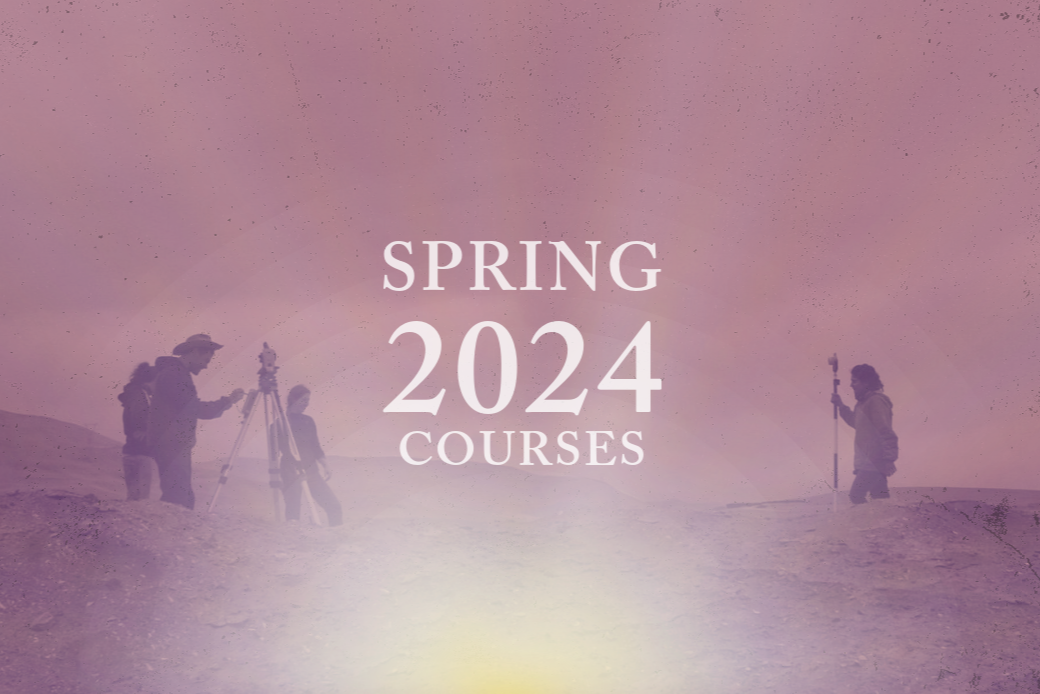Spring 2024 Offerings
************************************************************************************** ANG 5012: Fantastic Anthropology and Fringe Science
Tuesdays: 4:05 PM – 7:05 PM
Dr. David Daegling, Instructor
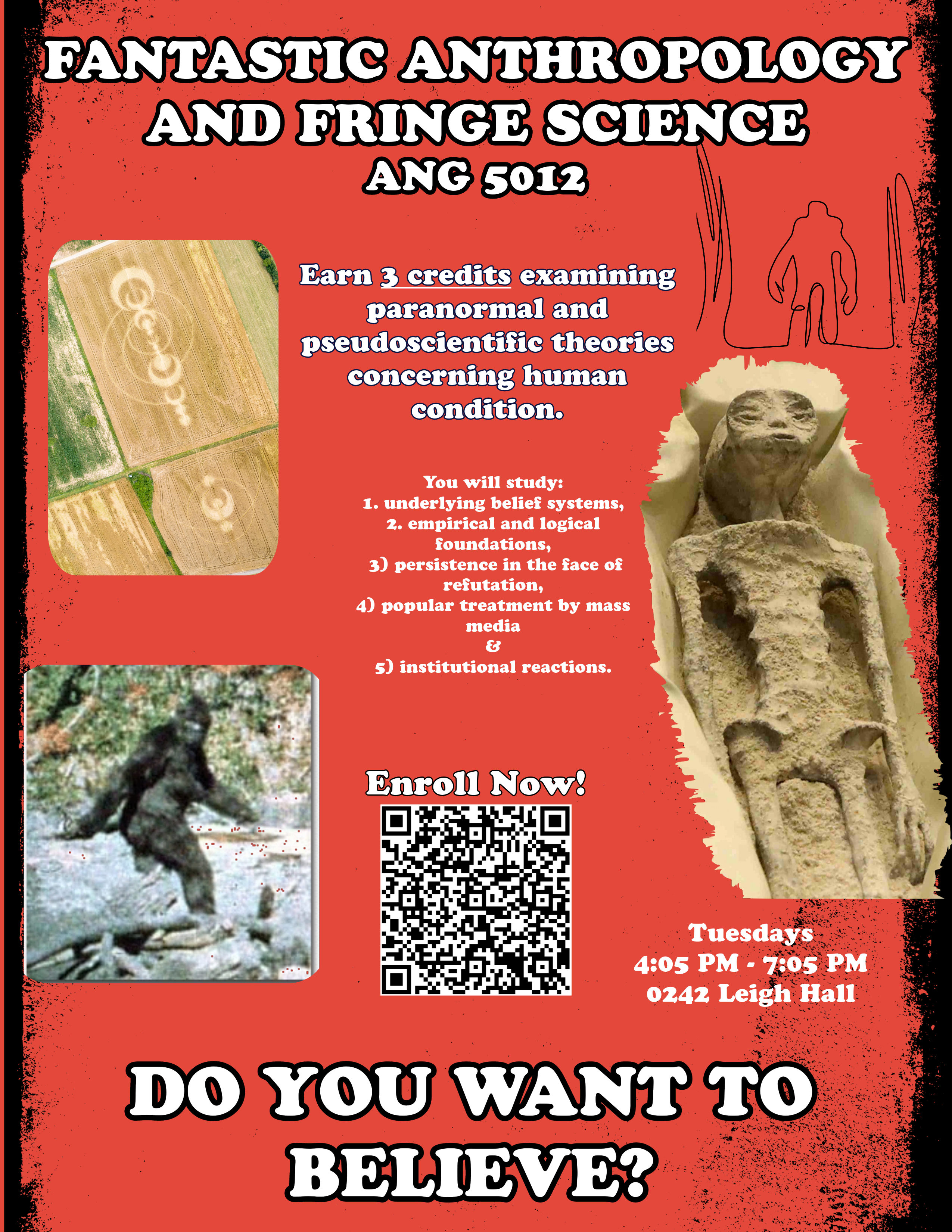
This course examines the articulation and perpetuation of so-called paranormal and fringe scientific theories concerning the human condition. We will examine these unconventional claims with respect to 1) underlying belief systems, 2) empirical and logical foundations, 3) persistence in the face of refutation, 4) popular treatment by mass media and 5) institutional reaction. The course is divided into five parts. Part I explores forms of inquiry and considers the demarcation of science from pseudoscience. Part II concerns unconventional theories of human evolution. Part III investigates unorthodox ideas of human biology. Part IV examines claims of extraterrestrial and supernatural contact in the world today. Part V further scrutinizes institutional reaction to fringe science, popular coverage of science, and the culture of science in the contemporary United States.
**************************************************************************************
ANT 2301: Human Sexuality and Culture
Monday 5:10-6:00 and Wednesday 5:10-7:05 Dr. Stephanie Bogart, Instructor
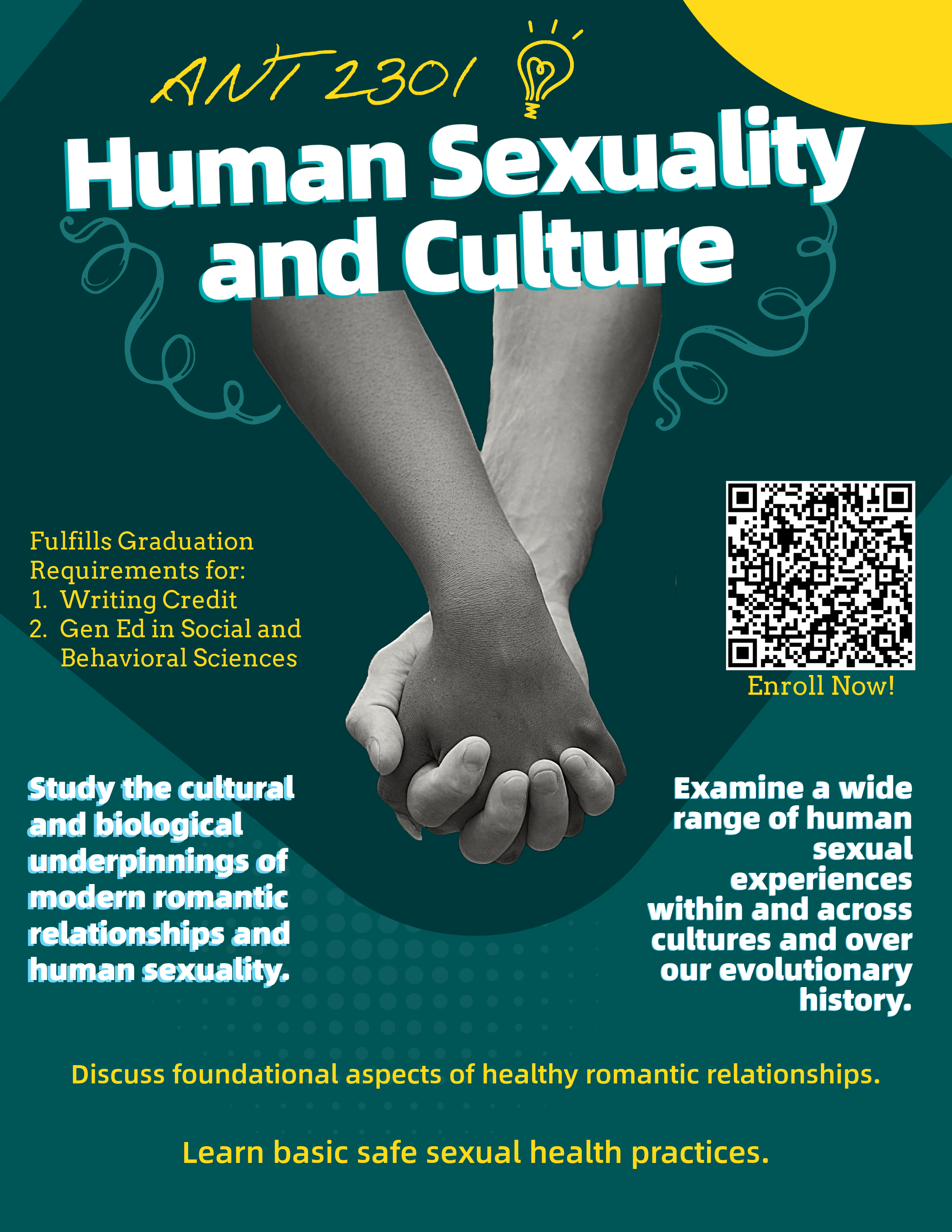 This course examines human sexuality from an anthropological point of view. The hallmark of anthropology is the emphasis on both the biological and cultural dimensions of what it means to be human. That perspective enriches our understanding of human sexuality because it encourages us to examine a wide range of human sexual experiences within and across cultures and over the evolutionary history of our species. We will apply this holistic perspective to the genetic, physiological, psychological, social, cultural, and evolutionary dimensions of human sexuality. Topics will include gender roles and identity, the interplay of behavior and sexual ethics, and biological foundations. This course is appropriate for those seeking an integrative approach to human sexuality.
This course examines human sexuality from an anthropological point of view. The hallmark of anthropology is the emphasis on both the biological and cultural dimensions of what it means to be human. That perspective enriches our understanding of human sexuality because it encourages us to examine a wide range of human sexual experiences within and across cultures and over the evolutionary history of our species. We will apply this holistic perspective to the genetic, physiological, psychological, social, cultural, and evolutionary dimensions of human sexuality. Topics will include gender roles and identity, the interplay of behavior and sexual ethics, and biological foundations. This course is appropriate for those seeking an integrative approach to human sexuality.
**************************************************************************************
ANT4930: The Archaeology of Violence
Tuesdays 9:35 AM – 11:30 AM and Thursdays 10:40 AM – 11:30 AM
Dr. Gabriel Prieto, Instructor
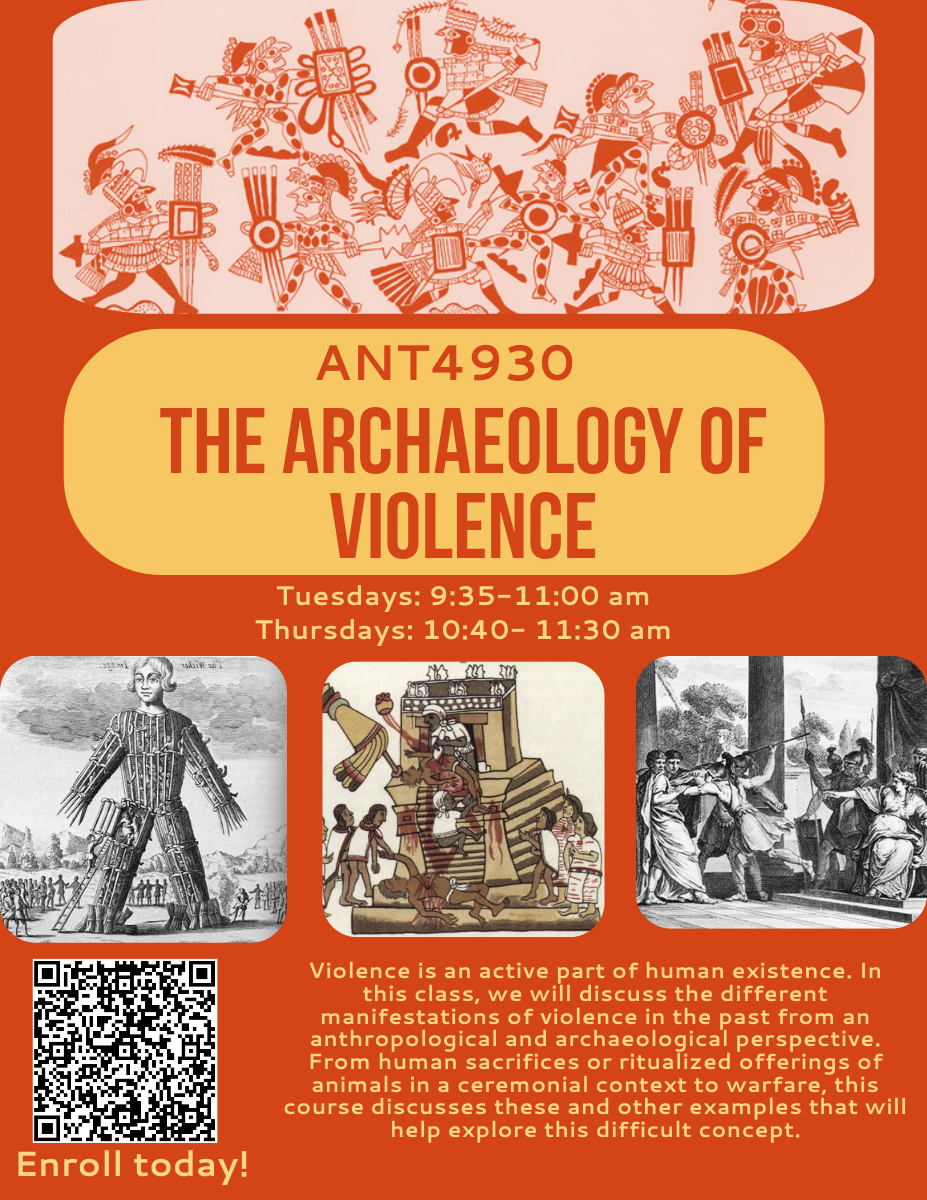 Violence is an active part of human existence. There are multiple examples of different types of violence in the past, which have been recorded in texts and social memory. Many are still hidden in ancient sites around the world. In this class, we will discuss the different manifestations of violence in the past from an anthropological and archaeological perspective. For example, we will explore politized violence and the social and cultural implications of violence in ancient societies. From human sacrifices or ritualized offerings of animals in a ceremonial context to warfare, this course discusses these and other examples that will help explore this difficult concept from an anthropological perspective. We will critically explore the reasons for and impacts of these practices based on each case. How should we conceive social violence in ancient societies? Should we judge these practices based on our modern 21st-century worldview?
Violence is an active part of human existence. There are multiple examples of different types of violence in the past, which have been recorded in texts and social memory. Many are still hidden in ancient sites around the world. In this class, we will discuss the different manifestations of violence in the past from an anthropological and archaeological perspective. For example, we will explore politized violence and the social and cultural implications of violence in ancient societies. From human sacrifices or ritualized offerings of animals in a ceremonial context to warfare, this course discusses these and other examples that will help explore this difficult concept from an anthropological perspective. We will critically explore the reasons for and impacts of these practices based on each case. How should we conceive social violence in ancient societies? Should we judge these practices based on our modern 21st-century worldview?
**************************************************************************************
ANT 3478: Global Health Culture
Online or In-person Monday, Wednesday, Friday 12:50 PM – 1:40 PM
Dr. Adrienne Strong, Instructor
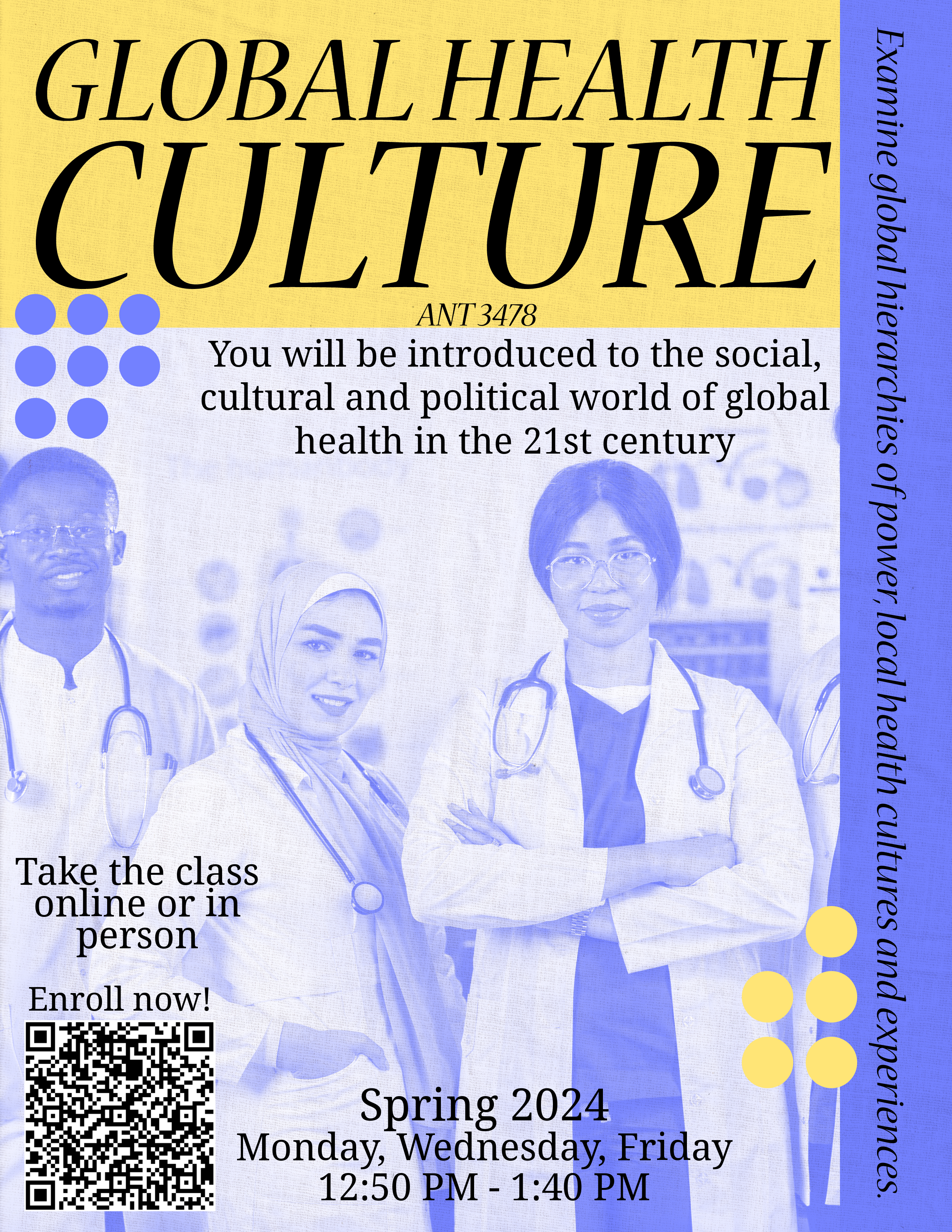 The term global health is ubiquitous today. We hear about global health in the news, in the numerous and growing institutions dedicated to global health research, or even in our own hopes and future career trajectories as scholars concerned with health and social justice worldwide. But what does the term ‘global health’ really mean? This course will provide a historical and ethnographic engagement with global health in the contemporary world. What might a critical study of global health tell us about the issues and voices that have been historically included and excluded in health interventions and policies across the globe? What constitutes “the global” and “the local” in global health? Where might we find room for different understandings of health, illness and disease?
The term global health is ubiquitous today. We hear about global health in the news, in the numerous and growing institutions dedicated to global health research, or even in our own hopes and future career trajectories as scholars concerned with health and social justice worldwide. But what does the term ‘global health’ really mean? This course will provide a historical and ethnographic engagement with global health in the contemporary world. What might a critical study of global health tell us about the issues and voices that have been historically included and excluded in health interventions and policies across the globe? What constitutes “the global” and “the local” in global health? Where might we find room for different understandings of health, illness and disease?
**************************************************************************************
ANT 2402/LAS 3930: Anthropology of Sustainability
Tuesdays 10:40 AM – 11:30 AM and Thursdays 10:40 AM – 12:35 PM
Dr. Catherine Tucker, Instructor
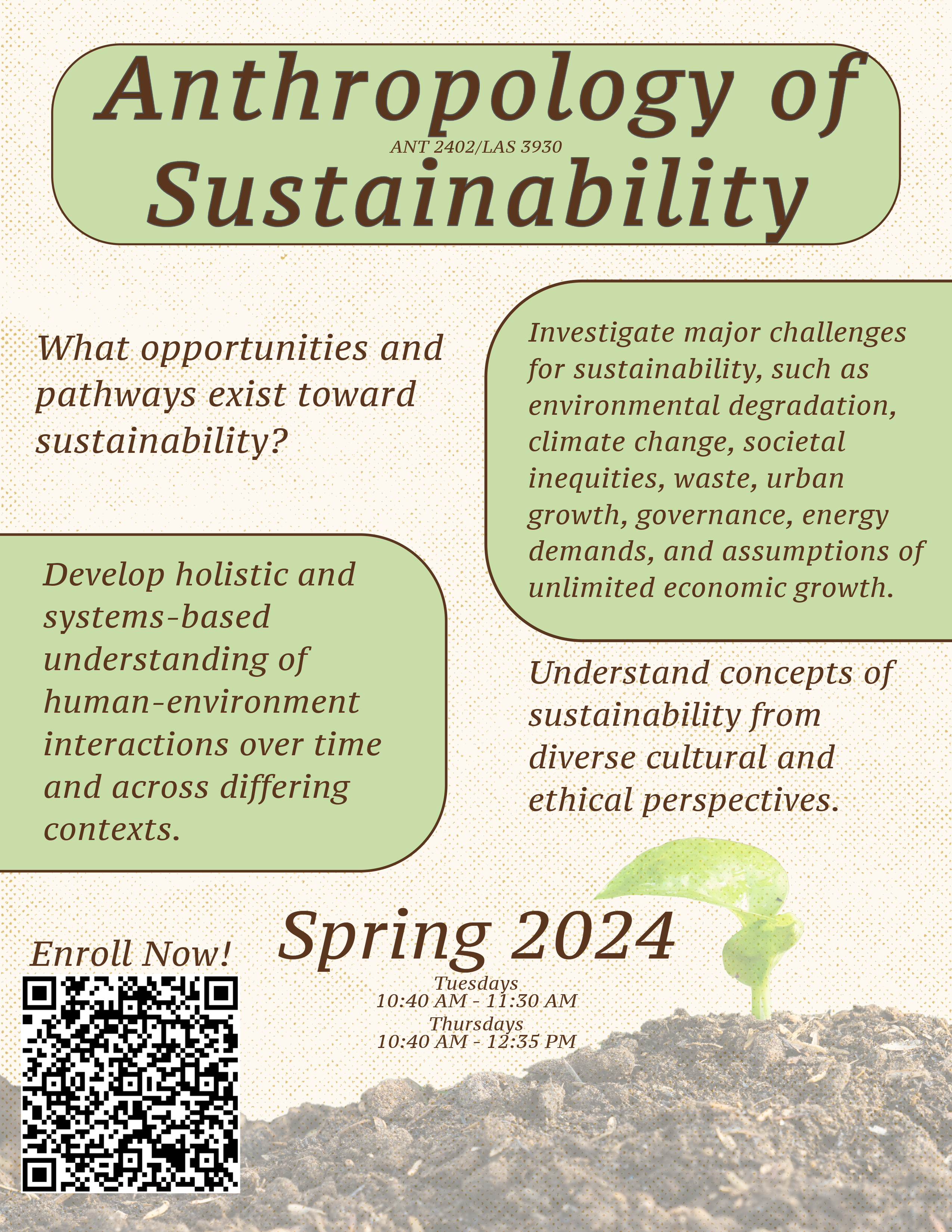 Achieving sustainability constitutes one of the greatest challenges confronting humanity and modern global society. This course will apply anthropological approaches (sociocultural, biophysical, and archaeological) to explore the concept of sustainability. By examining human-environment interactions over time and across diverse sociocultural and ecological contexts, we will consider cross-cultural experiences of sustainability — and unsustainability — and what they reveal about modern dilemmas and enduring human conundrums. Drawing on interdisciplinary anthropological studies we will investigate major challenges for sustainability, such as environmental degradation, climate change, societal inequities, waste and planned obsolescence, rapid urban growth, governance shortcomings, energy demands, and assumptions of unlimited economic growth. In the process, we will critically examine existing knowledge and our own understandings as we ask a central question: What opportunities and pathways exist toward sustainability? The course will address the four clusters of sustainability studies: Ethics, Culture and Human Behavior; Economics, Law and Policy; Production Systems and the Built Environment; Ecology and Environmental Stewardship.
Achieving sustainability constitutes one of the greatest challenges confronting humanity and modern global society. This course will apply anthropological approaches (sociocultural, biophysical, and archaeological) to explore the concept of sustainability. By examining human-environment interactions over time and across diverse sociocultural and ecological contexts, we will consider cross-cultural experiences of sustainability — and unsustainability — and what they reveal about modern dilemmas and enduring human conundrums. Drawing on interdisciplinary anthropological studies we will investigate major challenges for sustainability, such as environmental degradation, climate change, societal inequities, waste and planned obsolescence, rapid urban growth, governance shortcomings, energy demands, and assumptions of unlimited economic growth. In the process, we will critically examine existing knowledge and our own understandings as we ask a central question: What opportunities and pathways exist toward sustainability? The course will address the four clusters of sustainability studies: Ethics, Culture and Human Behavior; Economics, Law and Policy; Production Systems and the Built Environment; Ecology and Environmental Stewardship.
**************************************************************************************
ANT3620: Language and Culture
Mondays 12:50 PM – 1:40 PM and Fridays 12:50 PM – 2:45 PM
Dr. Moodjalin “Mood” Sudcharoen (pronunciation: soot-jah-rern), Instructor
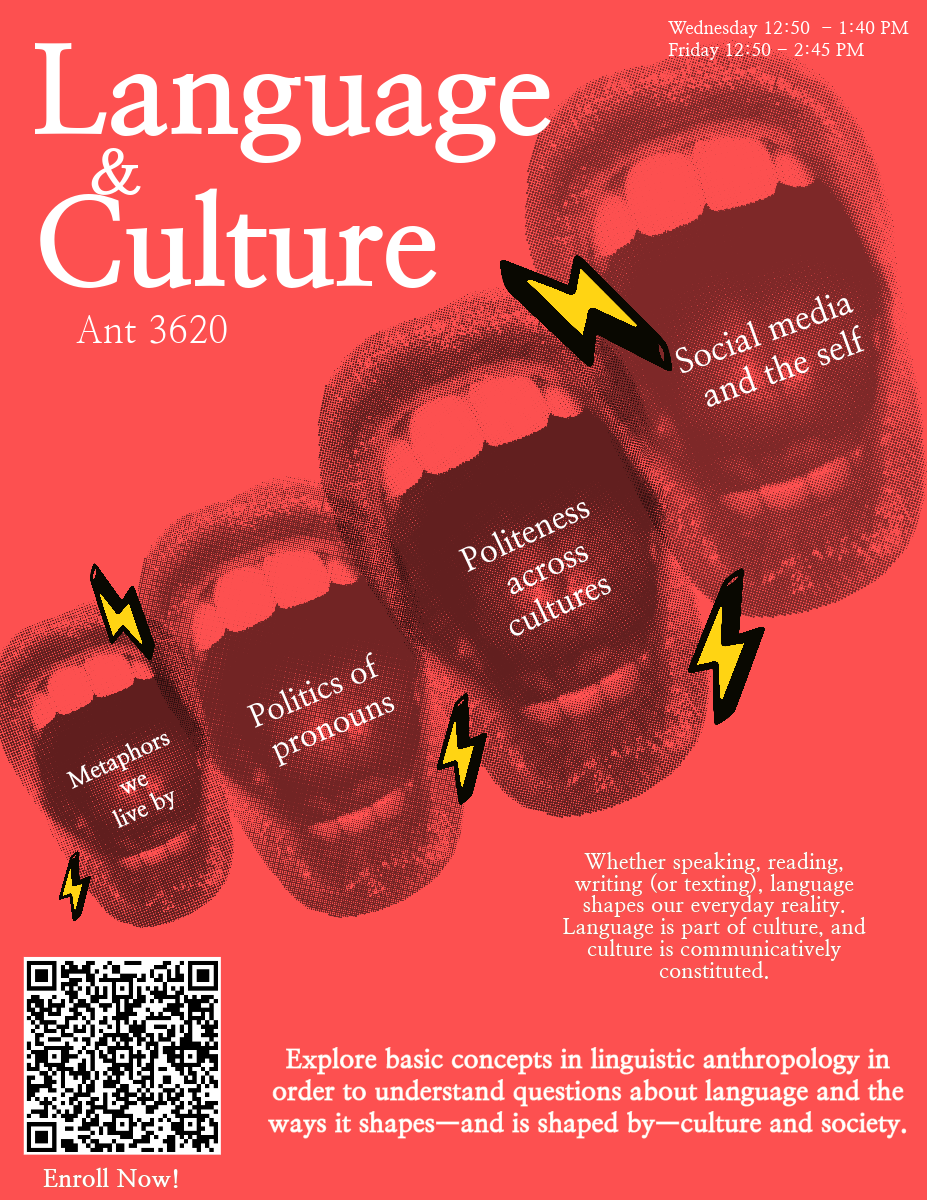 Whether speaking, reading, writing (or texting), language pervades our lives. Language shapes our everyday reality. It informs our sense of self, identity, and community. Language is part of culture, and culture is communicatively constituted. In this course, we will explore basic concepts in linguistic anthropology in order to understand how this field approach enduring questions about language and the ways it shapes—and is shaped by—culture and society. (S) Linguistic anthropology is one of the four primary subfields of anthropology in the United States and has close connections to the field of linguistics. Its beginnings go back to the formation of the discipline in the late 19th century and are strongly influenced by the study of American Indian languages. Linguistic anthropologists combine linguistic and anthropological techniques in their work and focus on a variety of areas, including: Interactions between linguistic and non-linguistic cognition (S); language and social categories such as class, gender, race, and ethnicity; language acquisition and socialization (S, N); language and digital worlds (S); language politics and national borders (N); language documentation and revitalization (S, N).
Whether speaking, reading, writing (or texting), language pervades our lives. Language shapes our everyday reality. It informs our sense of self, identity, and community. Language is part of culture, and culture is communicatively constituted. In this course, we will explore basic concepts in linguistic anthropology in order to understand how this field approach enduring questions about language and the ways it shapes—and is shaped by—culture and society. (S) Linguistic anthropology is one of the four primary subfields of anthropology in the United States and has close connections to the field of linguistics. Its beginnings go back to the formation of the discipline in the late 19th century and are strongly influenced by the study of American Indian languages. Linguistic anthropologists combine linguistic and anthropological techniques in their work and focus on a variety of areas, including: Interactions between linguistic and non-linguistic cognition (S); language and social categories such as class, gender, race, and ethnicity; language acquisition and socialization (S, N); language and digital worlds (S); language politics and national borders (N); language documentation and revitalization (S, N).
**************************************************************************************
ANT 3141 – Development of World Civilizations
Online or In-person Tuesdays 11:45 AM – 1:40 PM Thursdays 12:50 PM – 1:40 PM
Dr. Michael Heckenberger and Anthony Farace, Instructors
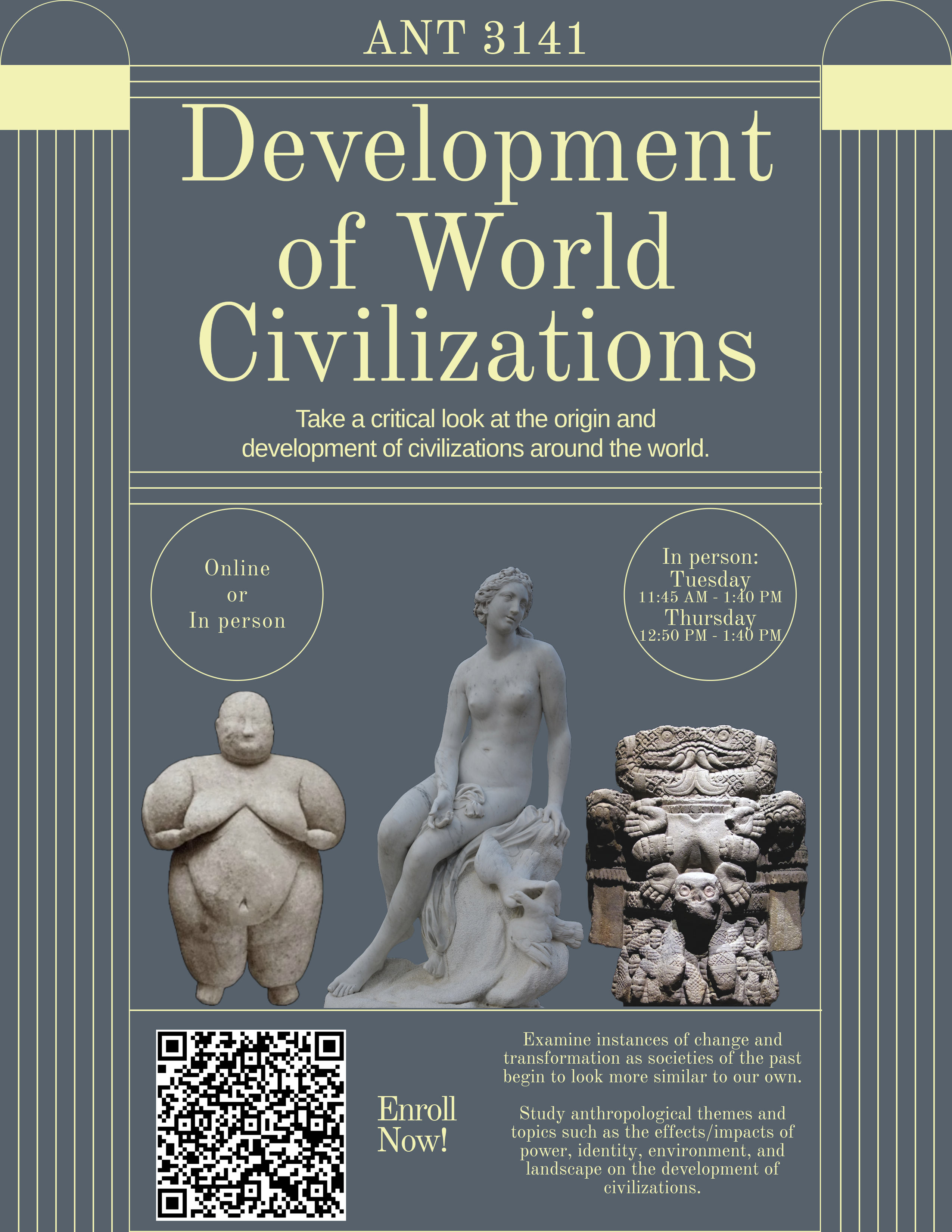 This is a course focusing on ancient world civilizations, stopping off at various points across the globe over a broad range of time. The main focus will be on cases of pre-colonial era (pre-AD 1500) civilizations around the world centering on change, sustainability, and social inequality. By taking this course you will gain knowledge and skills critical to understanding the processes and debates surrounding what has been termed civilization. This includes the domestication of plants and animals, the origins and consequences of agriculture, the influence of religion and technology and key aspects of village/urban life and state formation. This level of critical thinking will help you to better comprehend our world today and civilization’s progression into the future.
This is a course focusing on ancient world civilizations, stopping off at various points across the globe over a broad range of time. The main focus will be on cases of pre-colonial era (pre-AD 1500) civilizations around the world centering on change, sustainability, and social inequality. By taking this course you will gain knowledge and skills critical to understanding the processes and debates surrounding what has been termed civilization. This includes the domestication of plants and animals, the origins and consequences of agriculture, the influence of religion and technology and key aspects of village/urban life and state formation. This level of critical thinking will help you to better comprehend our world today and civilization’s progression into the future.
**************************************************************************************
ANT4552: Primate Behavior
Tuesday 9:35 AM – 10:25 AM Thursdays 9:35 AM – 11:30 AM & 11:45 AM – 12:35 PM
Dr. Stephanie Bogart, Instructor
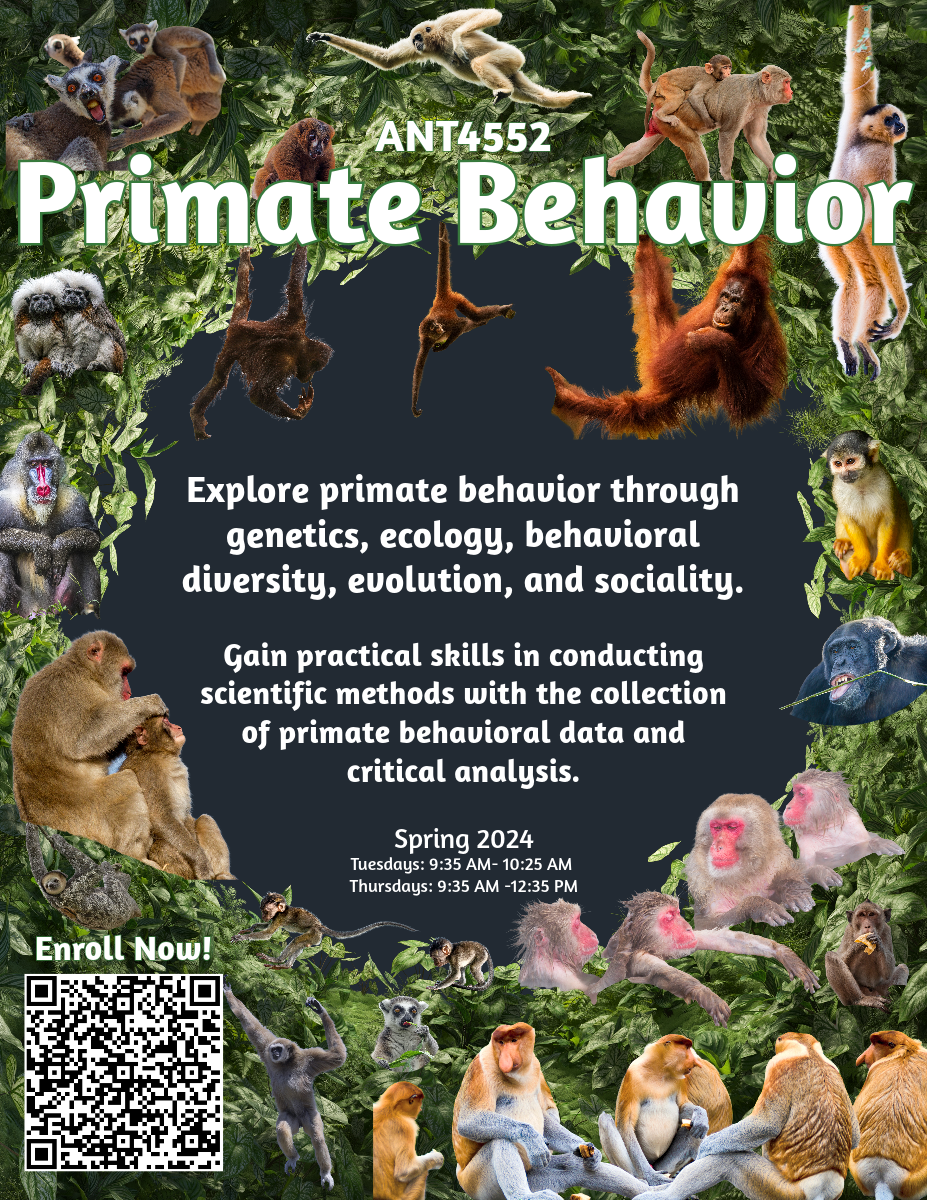 We will explore the central and cross-disciplinary concepts of primate behavior, which includes, but are not limited to genetics, ecology, behavioral diversity, evolution, and sociality; and how these factors shape primatology as a field. This course further investigates the interconnection of ecology and behavior, with implications for the origins of human behavior. Students will gain practical skills in conducting scientific methods collecting primate behavioral data and will be guided in a step-wise process. Students will collect data on a primate species and analyze the data for a written and oral report.
We will explore the central and cross-disciplinary concepts of primate behavior, which includes, but are not limited to genetics, ecology, behavioral diversity, evolution, and sociality; and how these factors shape primatology as a field. This course further investigates the interconnection of ecology and behavior, with implications for the origins of human behavior. Students will gain practical skills in conducting scientific methods collecting primate behavioral data and will be guided in a step-wise process. Students will collect data on a primate species and analyze the data for a written and oral report.
**************************************************************************************
ANT4930: Maritime Communities and Adaptations
Mondays 5:10 PM – 8:10 PM
Dr. Gabriel Prieto, Instructor
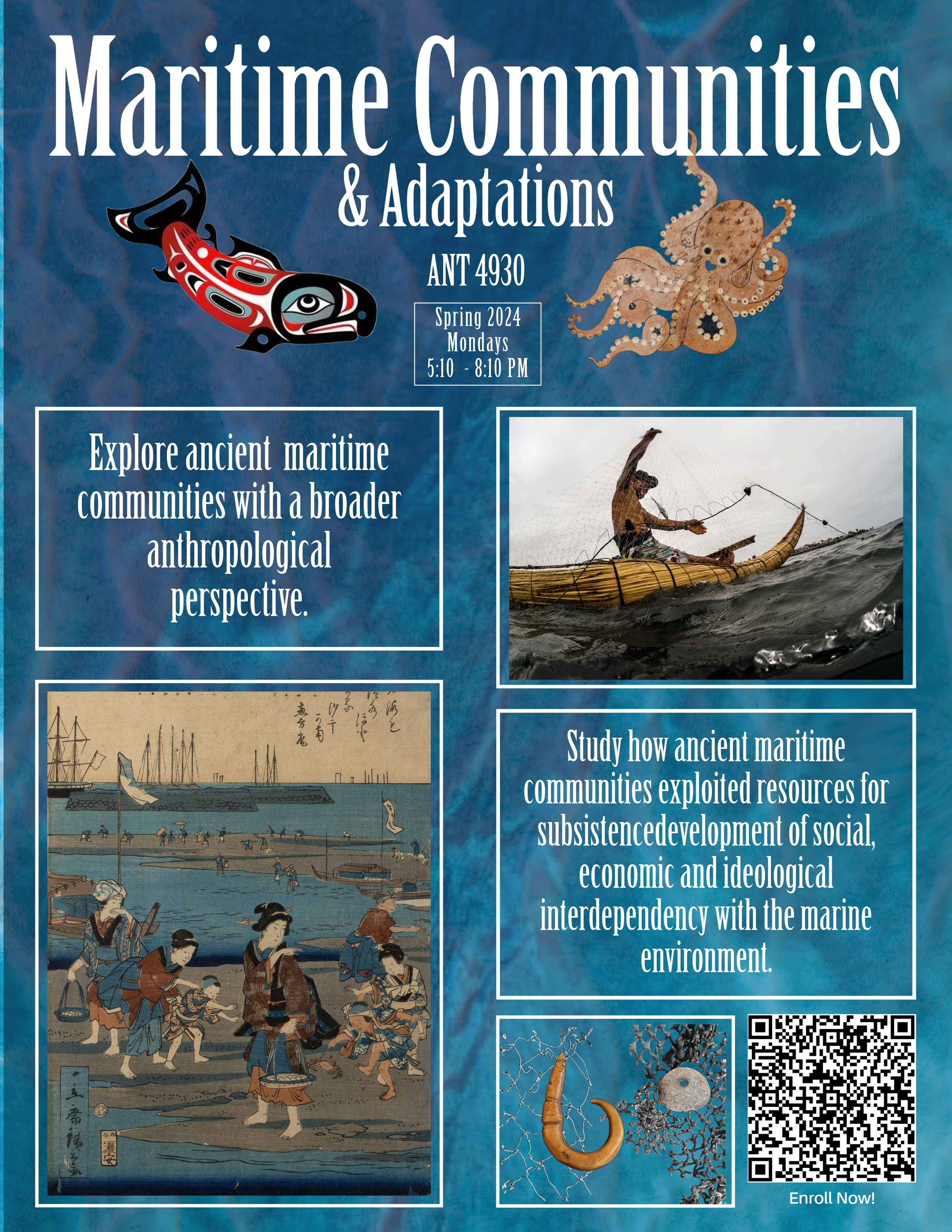
In this class, we will explore ancient maritime communities, defined as all human groups who have an emphasis on the exploitation of marine resources for subsistence, developing a social, economic and ideological interdependency with the marine environment. The study of maritime communities goes beyond subsistence patterns and adaptation strategies, including the study of coastal cultures from an anthropological perspective, emphasizing their social dynamics and economic interactions. Over the years, fishing technology has been used to classify marine “cultures” and helped to establish chronological sequences. Although this selection is a useful proxy for a better “materialization” of distinguished aspects of maritime communities around the globe, the concept should go beyond material identification and typologies, encompassing broader aspects of anthropological interest. This class aims to explore maritime communities in a broader anthropological perspective.
**************************************************************************************
ANT4586: Human Evolution
Online or In-person Tuesdays 1:55 PM – 2:45 PM Thursdays 1:55 PM – 3:50 PM
Dr. David Daegling, Instructor
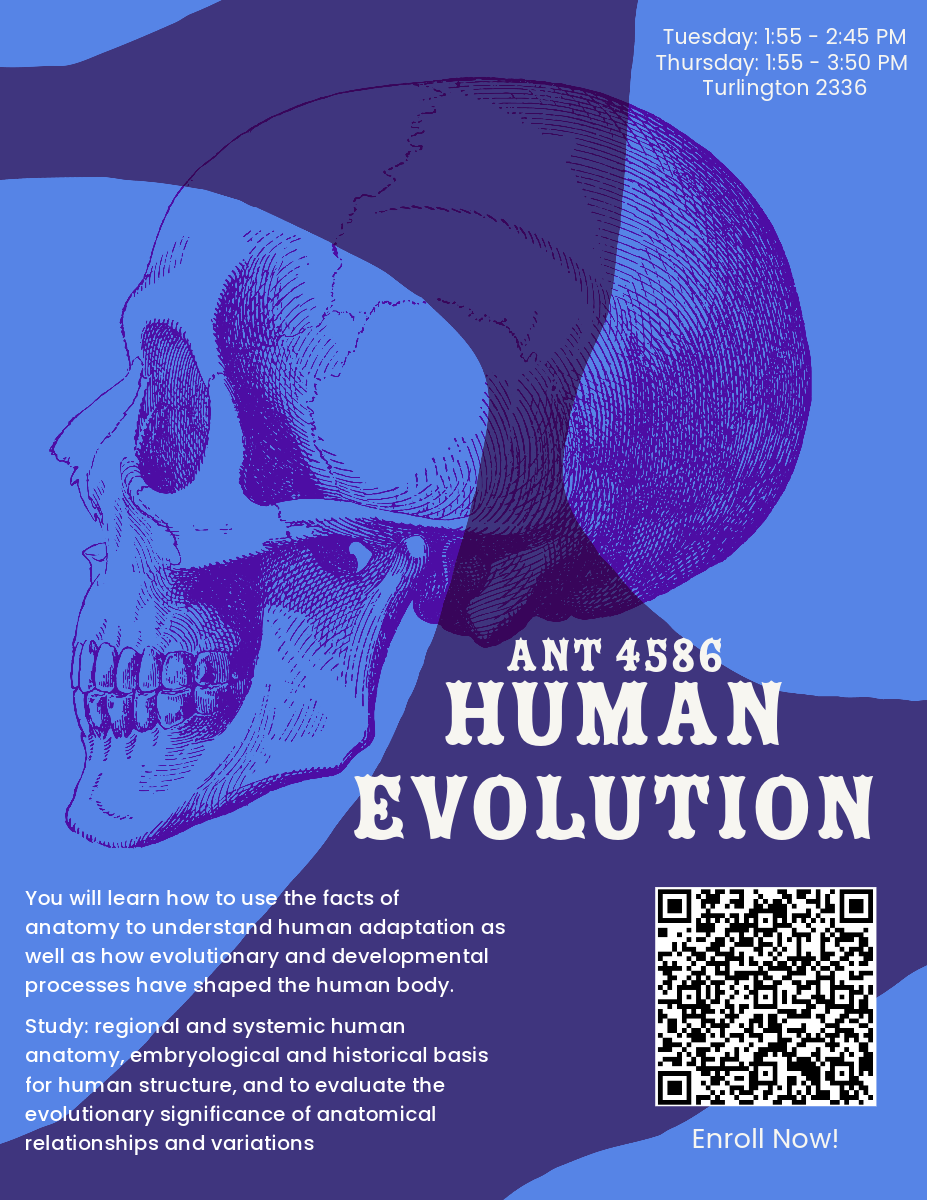 COURSE OBJECTIVES: 1) survey regional and systemic human anatomy; 2) explore the embryological and historical basis for human structure; 3) evaluate the evolutionary significance of anatomical relationships and variations. In this course, you will learn how to use the facts of anatomy to understand human adaptation as well as how evolutionary and developmental processes have shaped the human body.
COURSE OBJECTIVES: 1) survey regional and systemic human anatomy; 2) explore the embryological and historical basis for human structure; 3) evaluate the evolutionary significance of anatomical relationships and variations. In this course, you will learn how to use the facts of anatomy to understand human adaptation as well as how evolutionary and developmental processes have shaped the human body.
*************************************************************************************
ANT1215: Indigenous Values
In-person
Monday, Wednesday, Friday 9:35 AM – 10:25 AM
Dr. Ken Sassaman, Instructor
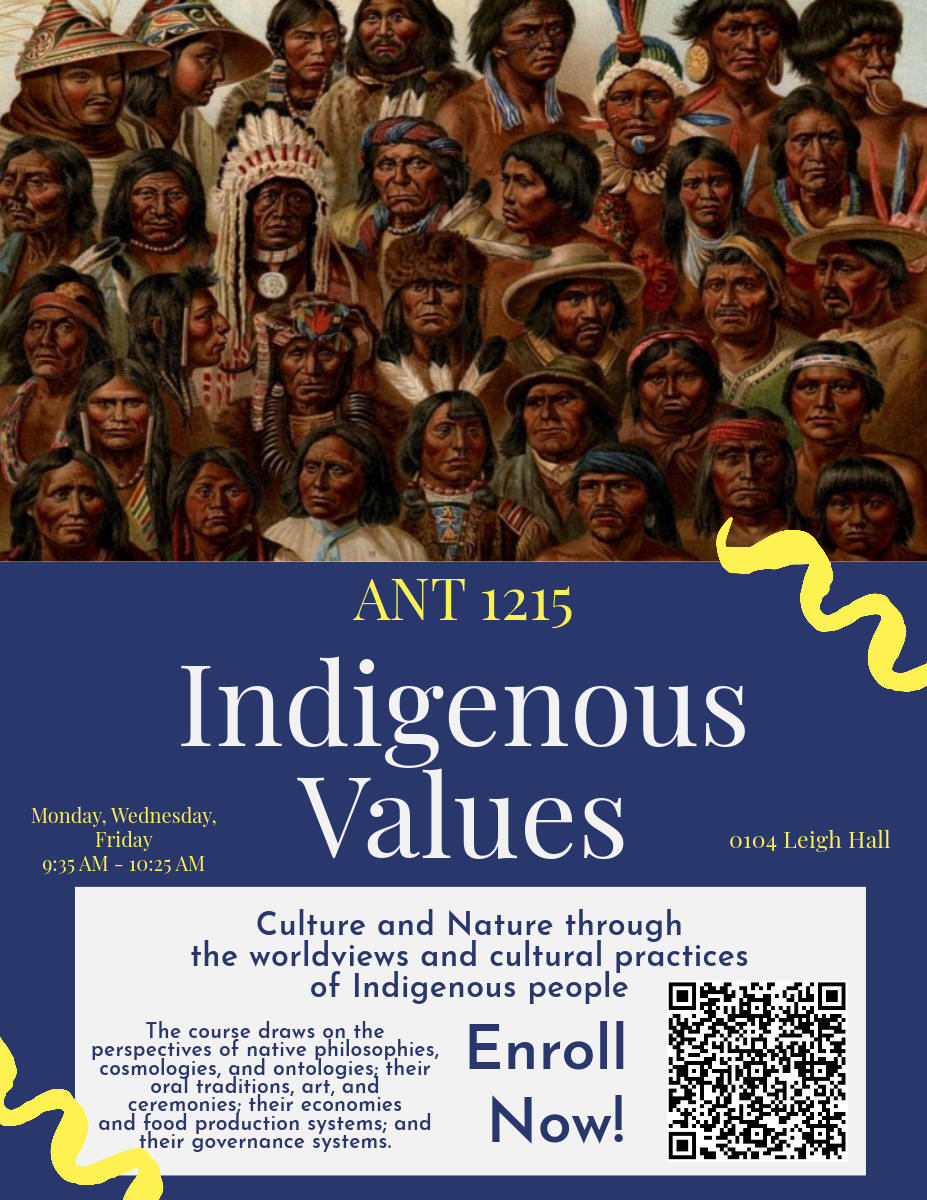 This interdisciplinary Quest 1 course explores the relation of Culture and Nature through the worldviews and cultural practices of Indigenous people. The separation of “culture” 2 from “nature” that is taken for granted by people of Western philosophical disposition is foreign to Indigenous peoples. Although they vary in innumerable ways, Indigenous people across the Americas share some common values derived in part from an understanding that their lives are part of, and inseparable from, the natural world. Attending to “nature” is not an intellectual exercise for Indigenous peoples; it is inherent to their worldviews and considered to be a sacred duty. It is worth considering that Indigenous values offer insight on improving the quality and equitability of human futures.
This interdisciplinary Quest 1 course explores the relation of Culture and Nature through the worldviews and cultural practices of Indigenous people. The separation of “culture” 2 from “nature” that is taken for granted by people of Western philosophical disposition is foreign to Indigenous peoples. Although they vary in innumerable ways, Indigenous people across the Americas share some common values derived in part from an understanding that their lives are part of, and inseparable from, the natural world. Attending to “nature” is not an intellectual exercise for Indigenous peoples; it is inherent to their worldviews and considered to be a sacred duty. It is worth considering that Indigenous values offer insight on improving the quality and equitability of human futures.
This course seeks to provide students with a broad base of scholarly reflections from the Arts and Humanities and allied fields on Indigenous Values in relation to the natural world and its resources. The course draws on the perspectives of native philosophies, cosmologies, and ontologies; their oral traditions, art, and ceremonies; their economies and food production systems; and their governance systems. Its focus is on what it means to be living in and interacting with the natural world, being oriented by cosmological principles, and a sense of spiritual responsibilities to the natural world and its resources. It examines how Indigenous peoples have represented and exercised those values in their traditions. Through field experiences, the course will introduce the students to archaeological, artistic, ethnographic, and linguistic evidence of these values.
**************************************************************************************
ANT2000 – General Anthropology
Online or In-person Tuesday 9:35 AM – 11:30 AM Thursday 9:35 AM – 10:25 AM
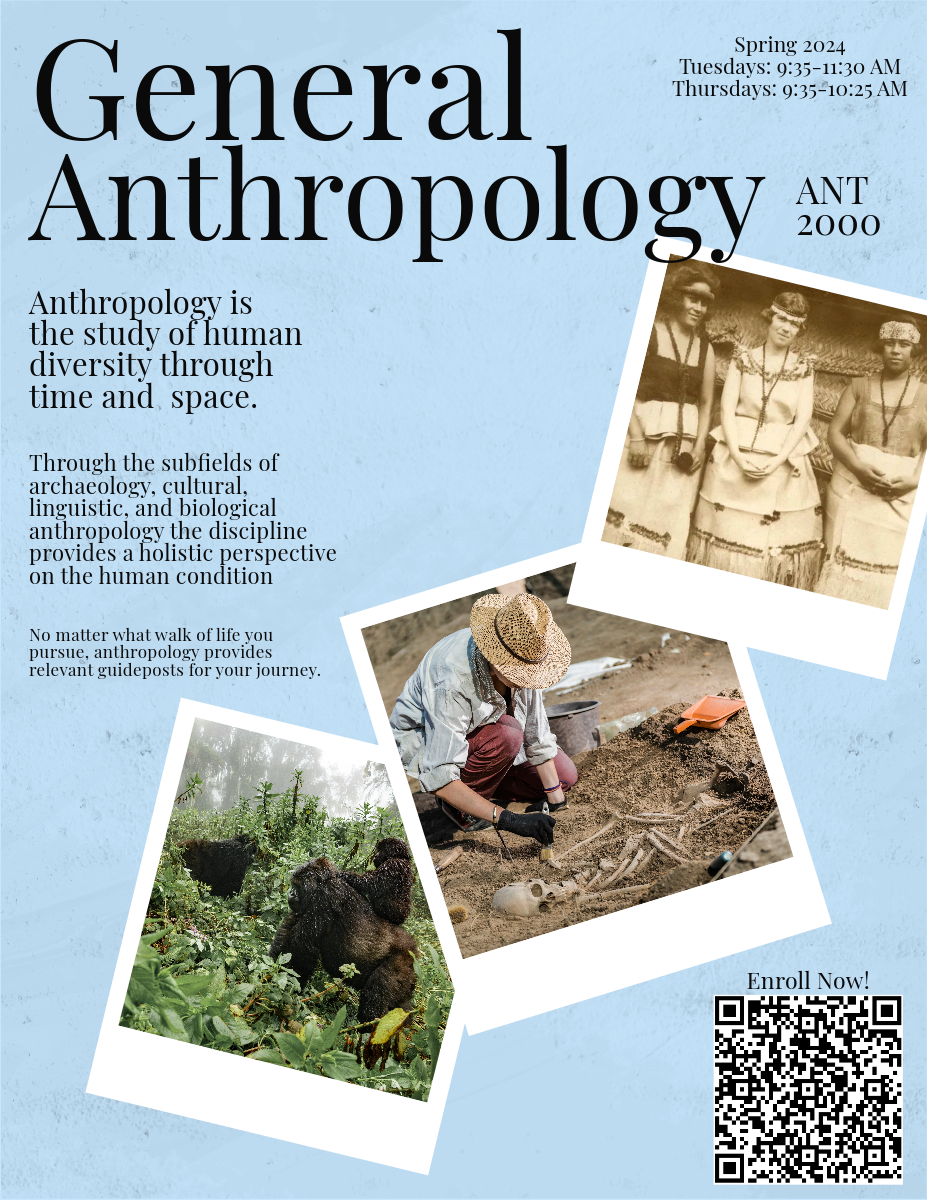 Anthropology is the study of human diversity through all time and across all space. Anthropology differs from other fields of social science in its emphasis on comparative or cross-cultural perspectives on human biology, society, and culture. Also setting anthropology apart from related disciplines is its holistic, unified perspective on the human condition. In this regard, anthropology appears boundless, spanning topics such as social organization, religion, technology, economics, symbolism, gender, reproduction, politics, genetics, biomechanics, subsistence, settlement patterns, migration, warfare, health and disease, growth and development, material culture, art, music, storytelling, and more. You have to open your mind, as famed anthropologist Margaret Mead insisted, to appreciate the breadth of the human condition. Anthropology provides the concepts and perspectives to help you achieve this goal. No matter what walk of life you pursue, anthropology provides relevant guideposts for your journey.
Anthropology is the study of human diversity through all time and across all space. Anthropology differs from other fields of social science in its emphasis on comparative or cross-cultural perspectives on human biology, society, and culture. Also setting anthropology apart from related disciplines is its holistic, unified perspective on the human condition. In this regard, anthropology appears boundless, spanning topics such as social organization, religion, technology, economics, symbolism, gender, reproduction, politics, genetics, biomechanics, subsistence, settlement patterns, migration, warfare, health and disease, growth and development, material culture, art, music, storytelling, and more. You have to open your mind, as famed anthropologist Margaret Mead insisted, to appreciate the breadth of the human condition. Anthropology provides the concepts and perspectives to help you achieve this goal. No matter what walk of life you pursue, anthropology provides relevant guideposts for your journey.
**************************************************************************************
ANT 4930: Primate Conservation
Wednesday 11:45 AM – 2:45 PM
Dr. Kim Valenta, Instructor
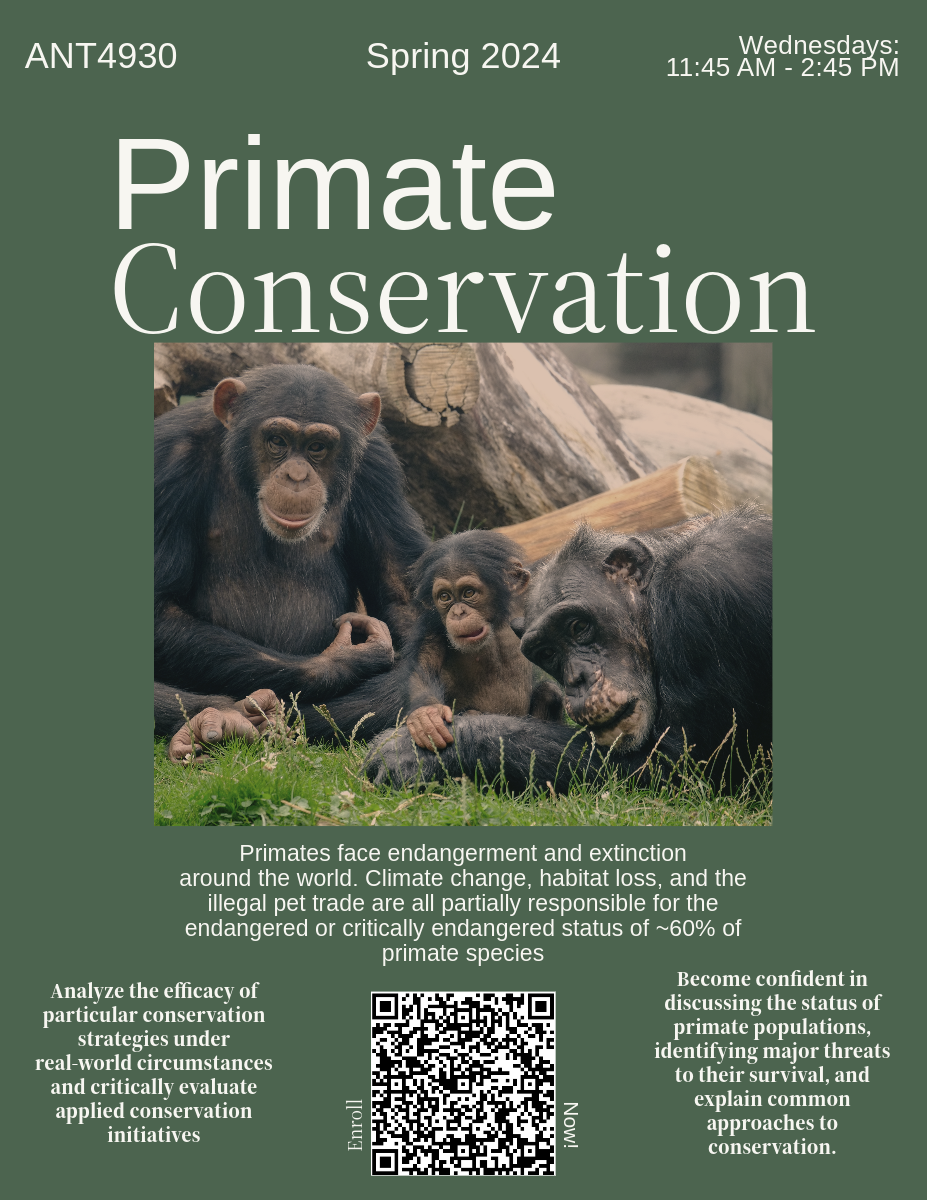 Primates, the mammalian order to which humans belong, face endangerment and extinction around the world. Human-induced disturbances such as climate change, habitat loss, and the illegal pet trade are partially responsible for the endangered or critically endangered status of ~60% of primate species. We will examine intrinsic and extrinsic risk factors within the framework of environmental ethics, conservation biology and evolutionary theory. After completing the course, students will be able to: 1. Confidently discuss the status of primate populations, identify major threats to their survival, and explain common approaches to conservation; 2. Analyze the efficacy of particular conservation strategies under real-world circumstances; •3. Critically evaluate applied conservation initiatives.
Primates, the mammalian order to which humans belong, face endangerment and extinction around the world. Human-induced disturbances such as climate change, habitat loss, and the illegal pet trade are partially responsible for the endangered or critically endangered status of ~60% of primate species. We will examine intrinsic and extrinsic risk factors within the framework of environmental ethics, conservation biology and evolutionary theory. After completing the course, students will be able to: 1. Confidently discuss the status of primate populations, identify major threats to their survival, and explain common approaches to conservation; 2. Analyze the efficacy of particular conservation strategies under real-world circumstances; •3. Critically evaluate applied conservation initiatives.
**************************************************************************************
ANT 3302 :Global Gender Issues
Monday, Wednesday, Friday 1:55 PM – 2:45 PM
Shreemoyee Sil, Instructor
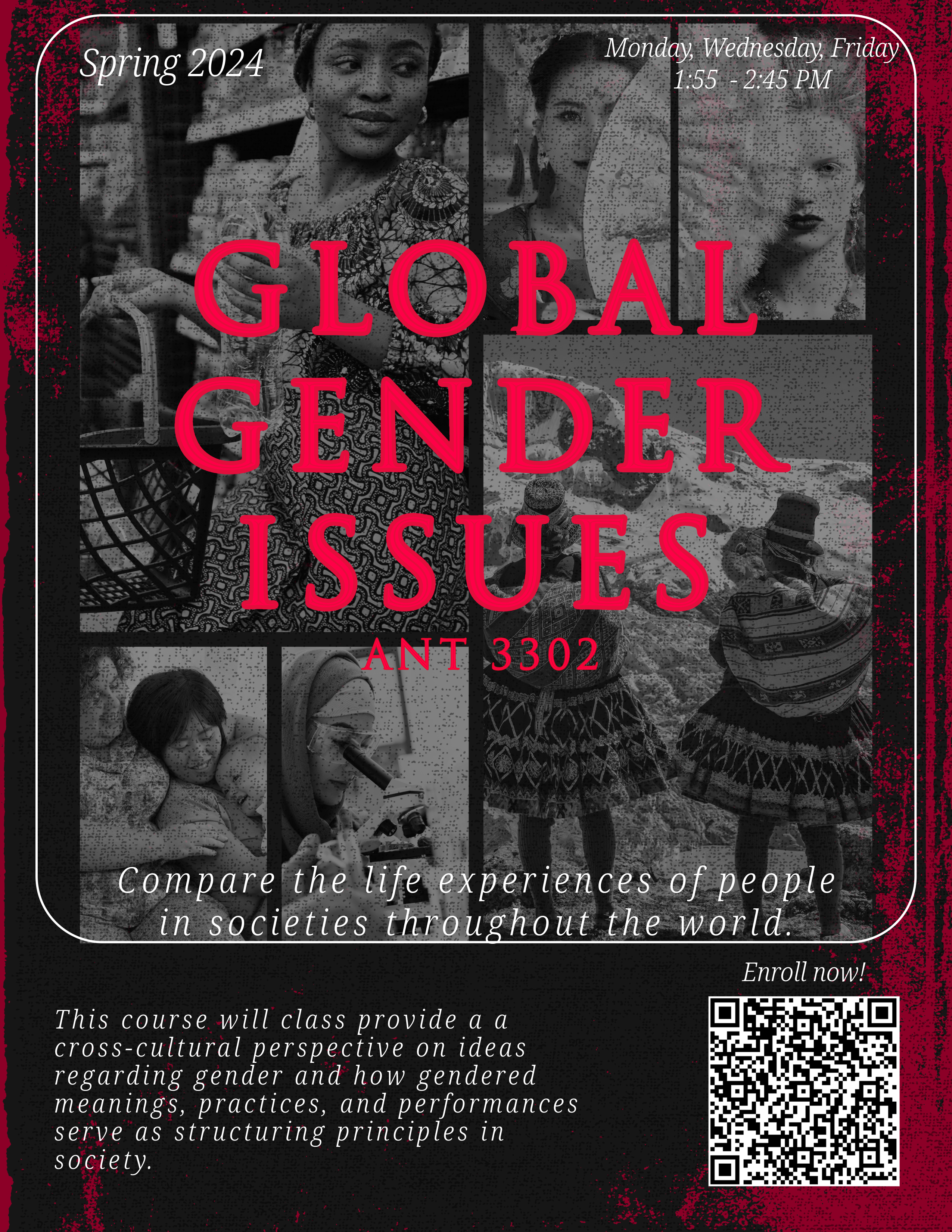 This course compares the life experiences of people in societies throughout the world. We will discuss the evidence regarding topics such as the universal subordination of women and examine explanations that propose to situate people’s gendered personality attributes, roles, and responsibilities in the biological or cultural domains. In general, through readings, films and lectures, the class will provide a cross-cultural perspective on ideas regarding gender and how gendered meanings, practices, and performances serve as structuring principles in society. Topics will include biology, gender, and sexual identity; social constructions of parenthood and gender roles; reproduction, kinship, and the household; colonialism and development; religion, ritual, and personhood; gender in the domestic and public space. The course will incorporate perspectives and reading material from and about world regions such as sub-Saharan Africa, the Middle East, South America, Asia, Europe, and the United States.
This course compares the life experiences of people in societies throughout the world. We will discuss the evidence regarding topics such as the universal subordination of women and examine explanations that propose to situate people’s gendered personality attributes, roles, and responsibilities in the biological or cultural domains. In general, through readings, films and lectures, the class will provide a cross-cultural perspective on ideas regarding gender and how gendered meanings, practices, and performances serve as structuring principles in society. Topics will include biology, gender, and sexual identity; social constructions of parenthood and gender roles; reproduction, kinship, and the household; colonialism and development; religion, ritual, and personhood; gender in the domestic and public space. The course will incorporate perspectives and reading material from and about world regions such as sub-Saharan Africa, the Middle East, South America, Asia, Europe, and the United States.
**************************************************************************************
ANT3467 : Food and Culture
Tuesday 10:40 AM – 12:35 PM Thursday 10:40 AM – 11:30 AM
Dr. Susan deFrance, Instructor
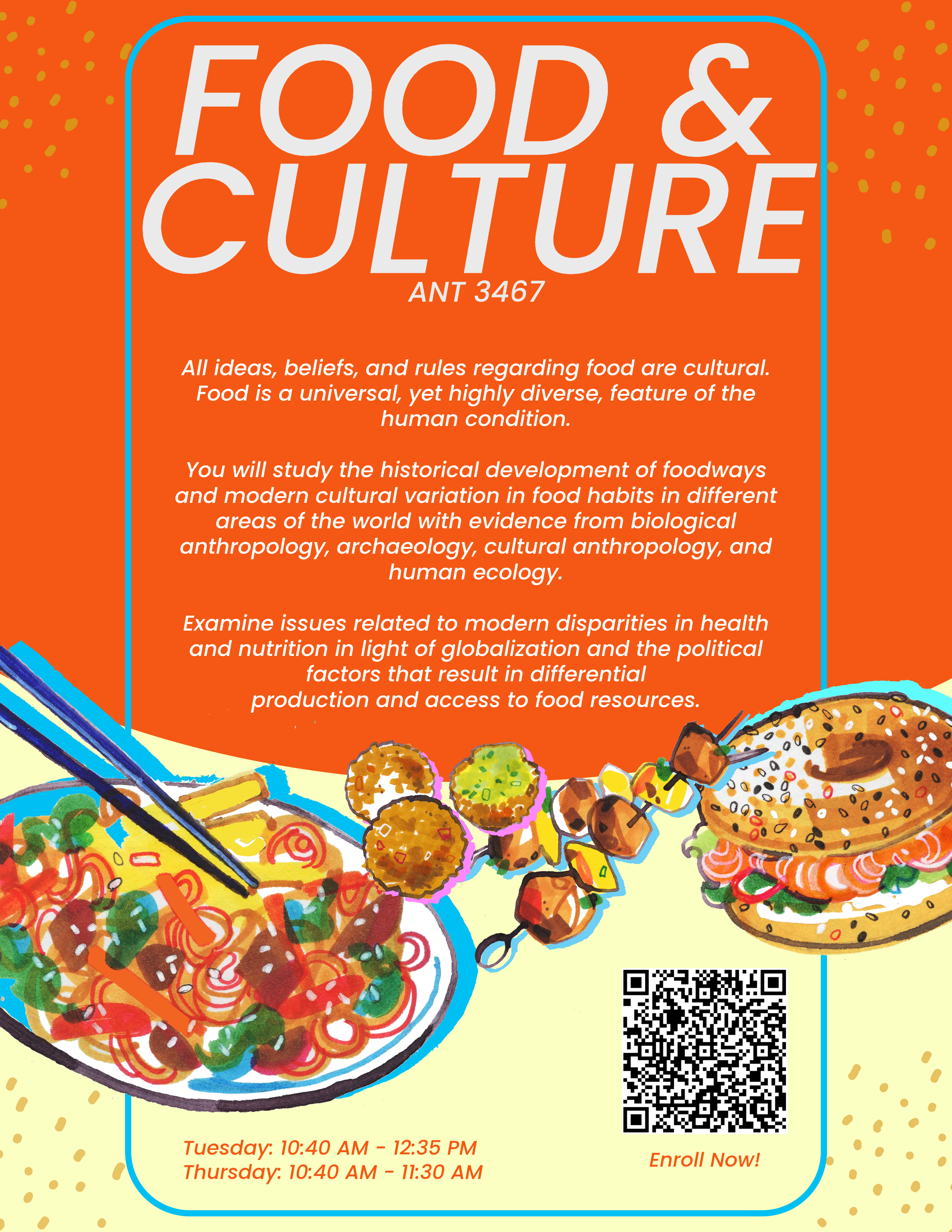 All ideas, beliefs, and rules regarding food are cultural; they are learned behavior. Food is a universal, yet highly diverse, feature of the human condition. Foodways function to create social unity, but also to distinguish cultures. How and why do cultures develop unique methods of food preparation and consumption? How do food rules develop and how are they maintained? The goal of this class is to gain an understanding of foodways in different cultures and how food habits function beyond providing calories and sustenance. We use information from biological anthropology, archaeology, cultural anthropology, and human ecology to understand the historical development of foodways and modern cultural variation in food habits in different areas of the world. We also examine issues related to modern disparities in health and nutrition in light of globalization and the political factors that result in differential production and access to food resources.
All ideas, beliefs, and rules regarding food are cultural; they are learned behavior. Food is a universal, yet highly diverse, feature of the human condition. Foodways function to create social unity, but also to distinguish cultures. How and why do cultures develop unique methods of food preparation and consumption? How do food rules develop and how are they maintained? The goal of this class is to gain an understanding of foodways in different cultures and how food habits function beyond providing calories and sustenance. We use information from biological anthropology, archaeology, cultural anthropology, and human ecology to understand the historical development of foodways and modern cultural variation in food habits in different areas of the world. We also examine issues related to modern disparities in health and nutrition in light of globalization and the political factors that result in differential production and access to food resources.
**************************************************************************************
ANT3520 – Skeleton Keys: Forensic Identification
Monday, Wednesday, Friday 11:45 AM – 12:35 PM
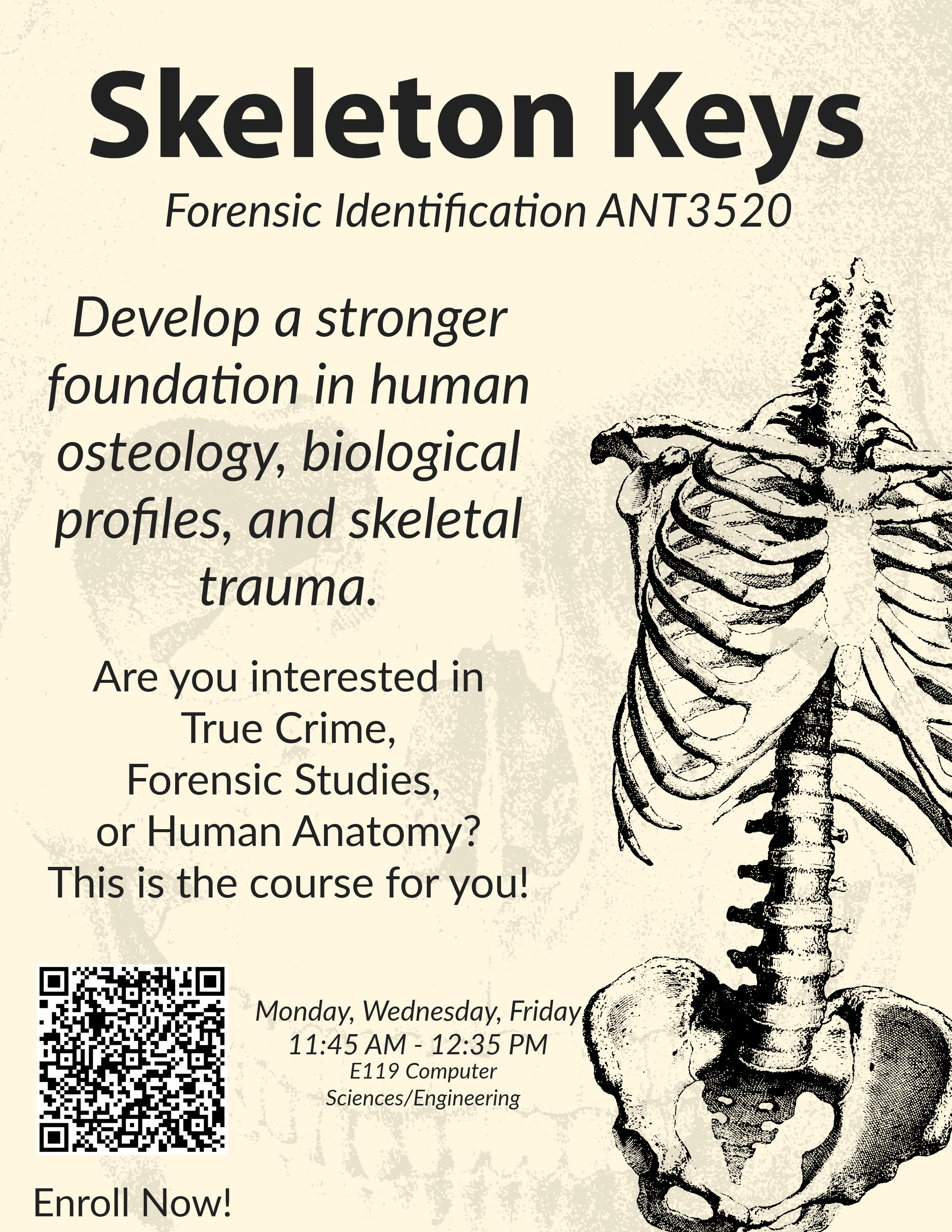 This course introduces the field of forensic anthropology. Forensic anthropology is an applied area of biological anthropology that focuses on the identification of human skeletal remains in a medicolegal context. This course will introduce you to basic terms and principles of forensic anthropology, focus on concepts and their applications, and present case histories. This is not intended to be a “how-to” course but a general overview of the discipline. Upon completion of this course, you should be able to: 1. Define the field of forensic anthropology and its purview; 2.Have a general understanding of human osteology; 3.Understand the basic concepts underlying determination of the biological profile, including sex, age, ancestry, and stature; 4.Describe different types of skeletal trauma, and differentiate between antemortem and postmortem trauma.
This course introduces the field of forensic anthropology. Forensic anthropology is an applied area of biological anthropology that focuses on the identification of human skeletal remains in a medicolegal context. This course will introduce you to basic terms and principles of forensic anthropology, focus on concepts and their applications, and present case histories. This is not intended to be a “how-to” course but a general overview of the discipline. Upon completion of this course, you should be able to: 1. Define the field of forensic anthropology and its purview; 2.Have a general understanding of human osteology; 3.Understand the basic concepts underlying determination of the biological profile, including sex, age, ancestry, and stature; 4.Describe different types of skeletal trauma, and differentiate between antemortem and postmortem trauma.
**************************************************************************************
ANT 2149: Lost Tribes and Sunken Continents: Pseudoarchaeology and Why It Matters
Tuesday 9:35 AM – 10:25 AM Thursday 9:35 AM – 11:30 AM
Dr. Whittaker Schroder, Instructor
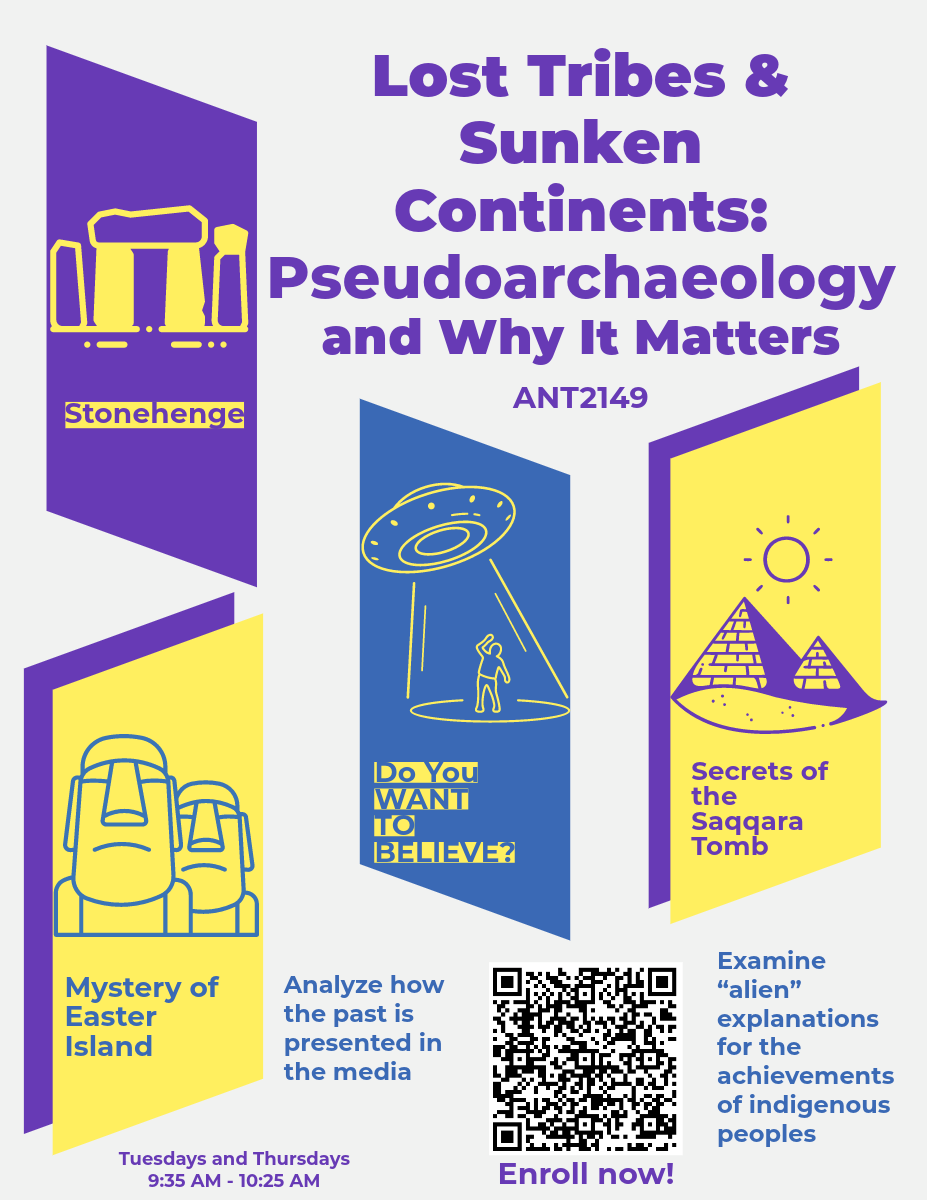 This course examines claims, popularized in the media, that mysterious archaeological sites, statues, etc. were influenced by outer space visitors. Case studies to be discussed include Stonehenge, various pyramids, Easter Island, Atlantis and Mu, the Nazca Lines, and other archaeological “mysteries.” Emphasis will be placed on understanding how and why pseudoscientific beliefs proliferate, and on understanding the real archaeological histories of ancient peoples.
This course examines claims, popularized in the media, that mysterious archaeological sites, statues, etc. were influenced by outer space visitors. Case studies to be discussed include Stonehenge, various pyramids, Easter Island, Atlantis and Mu, the Nazca Lines, and other archaeological “mysteries.” Emphasis will be placed on understanding how and why pseudoscientific beliefs proliferate, and on understanding the real archaeological histories of ancient peoples.
************************************************************************************** ANT 2140 :Introduction to World Archaeology
Online
Dr. Susan Gillespie, Instructor
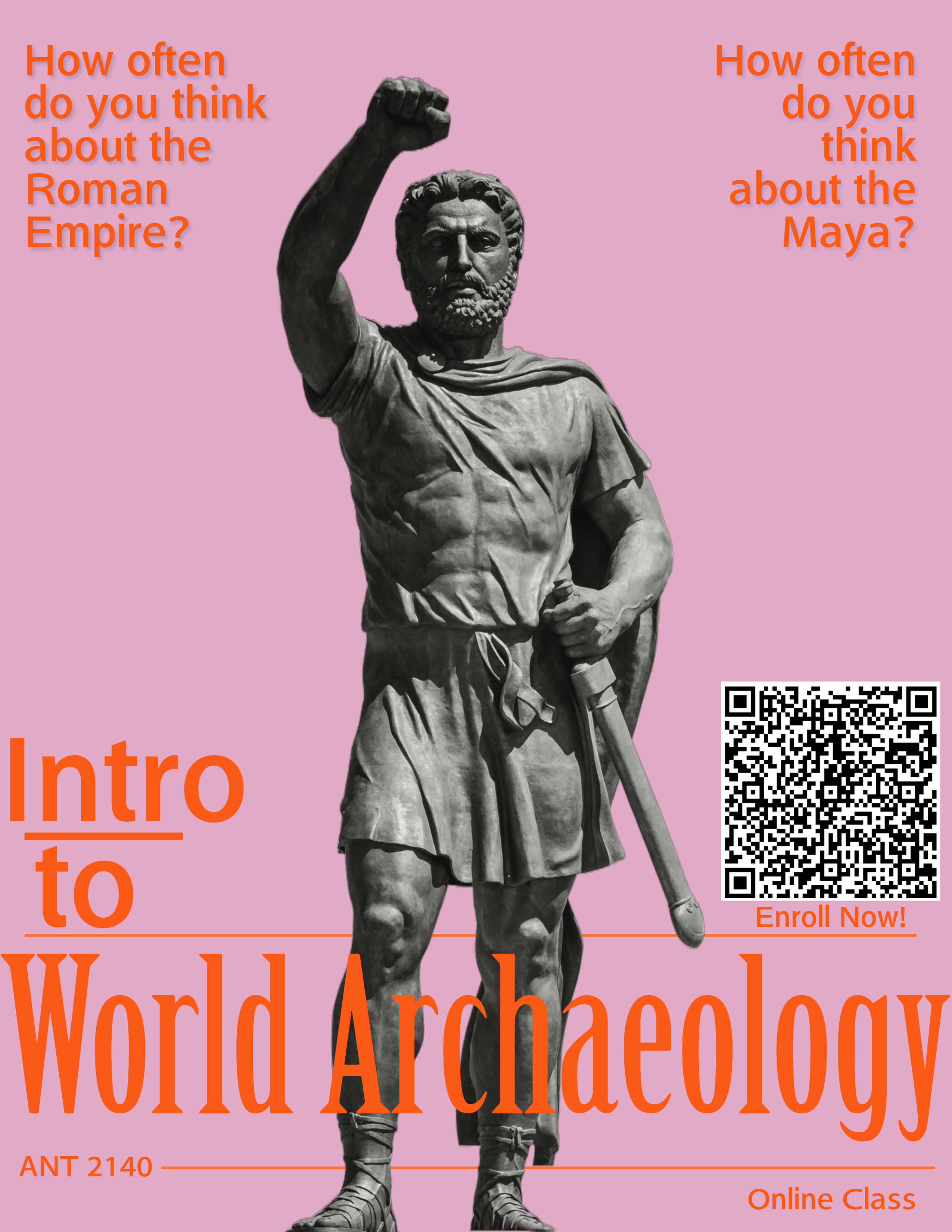 The global study of human culture from its origins to the present through the recovery, description, and analysis of archaeological remains. This course explores the totality of human experience on earth, as known through archaeology, from the beginnings of humankind into the present. Course content is not organized chronologically or regionally, but thematically, focusing on how humans have made themselves and their worlds in the past and continue to do so today. It is an archaeological contribution to the anthropological question, “What makes us human?” An anthropological archaeology can inform us of where we come from, how we got to where we are today, and where we might be going in the future.
The global study of human culture from its origins to the present through the recovery, description, and analysis of archaeological remains. This course explores the totality of human experience on earth, as known through archaeology, from the beginnings of humankind into the present. Course content is not organized chronologically or regionally, but thematically, focusing on how humans have made themselves and their worlds in the past and continue to do so today. It is an archaeological contribution to the anthropological question, “What makes us human?” An anthropological archaeology can inform us of where we come from, how we got to where we are today, and where we might be going in the future.
Case studies from around the world and all time periods are drawn upon to illuminate the diversity of past human experiences and explain the archaeological methods and techniques used to gain that knowledge. Through global comparison these case studies shed light on the diversity of world areas and commonalities in the human past. Archaeological investigation and dissemination of knowledge is also relevant to contemporary issues on a global scale, including indigenous rights, collective identities, heritage preservation, conservation biology, agricultural development, built environments, responses to climate change, and sustainability.
************************************************************************************** ANT 2410: Cultural Anthropology
Tuesday 3:00 PM – 4:55 PM Thursday 4:05 PM – 4:55 PM
Dr. Moodjalin “Mood” Sudcharoen (pronunciation: soot-jah-rern) , Instructor
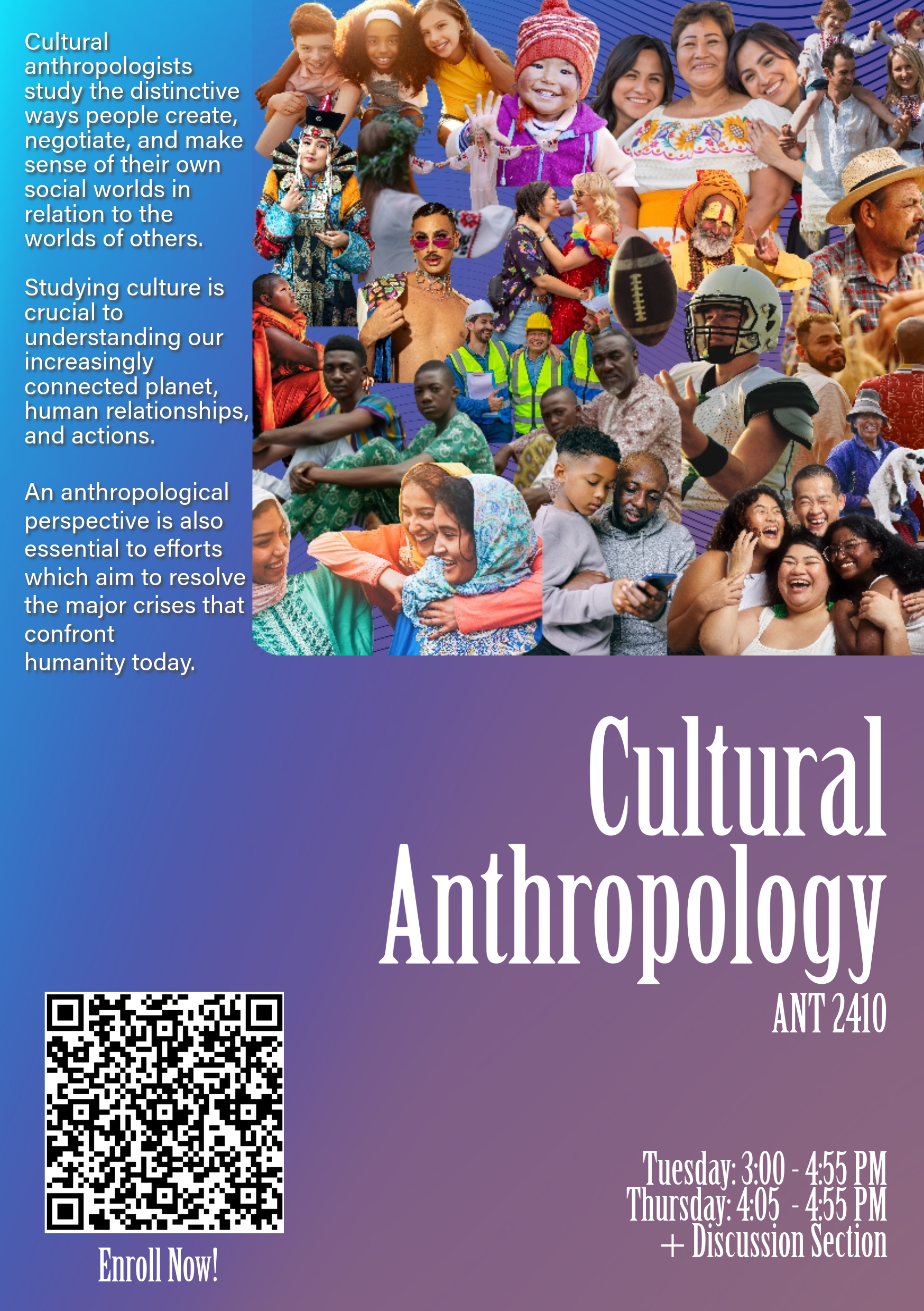 Anthropology is the academic discipline that studies humanity across all space and time. Cultural anthropologists study the distinctive ways people create, negotiate, and make sense of 2 their own social worlds in relation to the worlds of others. Through research in places both far away and near to home, anthropologists examine relations and events that influence and determine social belonging and exclusion, whether based on gender, kinship, religion, language, political economy, or historical constructions of race, ethnicity and citizenship. The scope of cultural anthropology is thus broad. Studying culture is crucial to understanding our increasingly connected planet, human relationships, and actions . An anthropological perspective is also essential to efforts which aim to resolve the major crises that confront humanity today.
Anthropology is the academic discipline that studies humanity across all space and time. Cultural anthropologists study the distinctive ways people create, negotiate, and make sense of 2 their own social worlds in relation to the worlds of others. Through research in places both far away and near to home, anthropologists examine relations and events that influence and determine social belonging and exclusion, whether based on gender, kinship, religion, language, political economy, or historical constructions of race, ethnicity and citizenship. The scope of cultural anthropology is thus broad. Studying culture is crucial to understanding our increasingly connected planet, human relationships, and actions . An anthropological perspective is also essential to efforts which aim to resolve the major crises that confront humanity today.
This class provides an introduction to the discipline through a consideration of topics and themes that are not only of vital relevance today but also hold an enduring place in the intellectual tradition of anthropology. The purpose of this class is to increase your familiarity and comfort with concepts of cultural analysis and to show how these notions can increase awareness and understanding of your own and others’ life experiences . In so doing, the course aims to enhance sensitivity to social differences while also underscoring the moral and ethical dimensions entailed by ethnographic research.
************************************************************************************** ANT4114: Principles of Archaeology
Tuesday 12:50 PM – 1:40 PM Thursday 12:50 PM – 1:40 PM, 1:55 PM – 2:45 PM
Dr. Susan Gillespie, Instructor
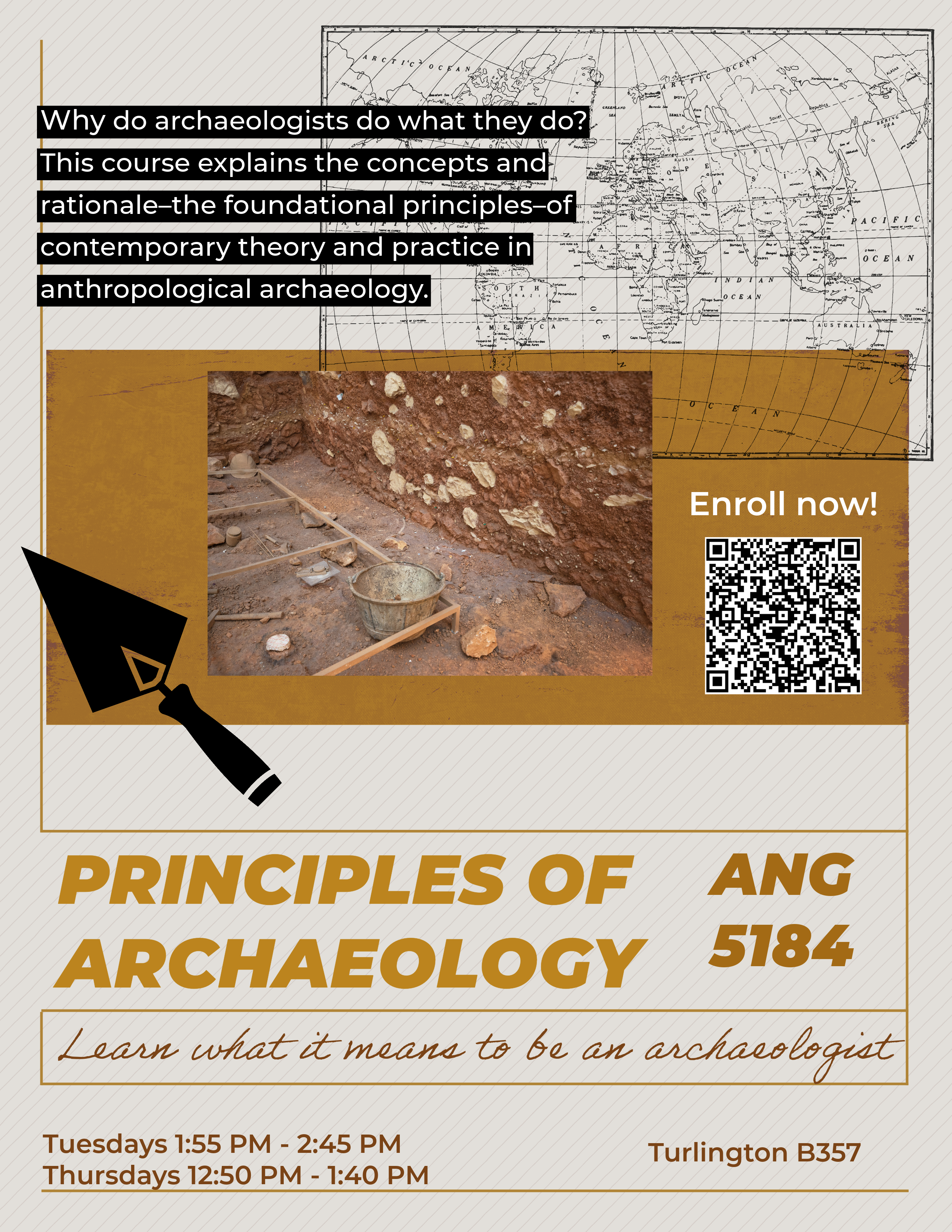 Why do archaeologists do what they do? ANT 4114 explains the concepts and rationale–the foundational principles–of contemporary theory and practice in anthropological archaeology. This course is designed for advanced anthropology majors and minors as well as majors in related disciplines seeking an overview of constructs and methods of archaeological research and interpretation. Content focuses on 21st century archaeology and includes current challenges facing archaeology as well as archaeology’s social relevance. The course combines lectures with practical hands-on applications of techniques in the laboratory period. Case studies and artifact examples are drawn from a variety of prehistoric and historic sites, with special attention to Florida archaeology. Students should already have some basic knowledge of archaeological techniques and world archaeology by having completed ANT 2140, ANT 3141, or an equivalent course.
Why do archaeologists do what they do? ANT 4114 explains the concepts and rationale–the foundational principles–of contemporary theory and practice in anthropological archaeology. This course is designed for advanced anthropology majors and minors as well as majors in related disciplines seeking an overview of constructs and methods of archaeological research and interpretation. Content focuses on 21st century archaeology and includes current challenges facing archaeology as well as archaeology’s social relevance. The course combines lectures with practical hands-on applications of techniques in the laboratory period. Case studies and artifact examples are drawn from a variety of prehistoric and historic sites, with special attention to Florida archaeology. Students should already have some basic knowledge of archaeological techniques and world archaeology by having completed ANT 2140, ANT 3141, or an equivalent course.
ANT 4114 is intended to prepare students for additional courses in archaeology, including area courses, field school, artifact analysis, zooarchaeology, and paleobotany. It is essential training for anyone contemplating graduate study in anthropology and archaeology or for a career in practicing or academic archaeology, as well as forensic anthropology, Classics, history, art history, museology, historic site interpretation, cultural resource management, and historic preservation law.
